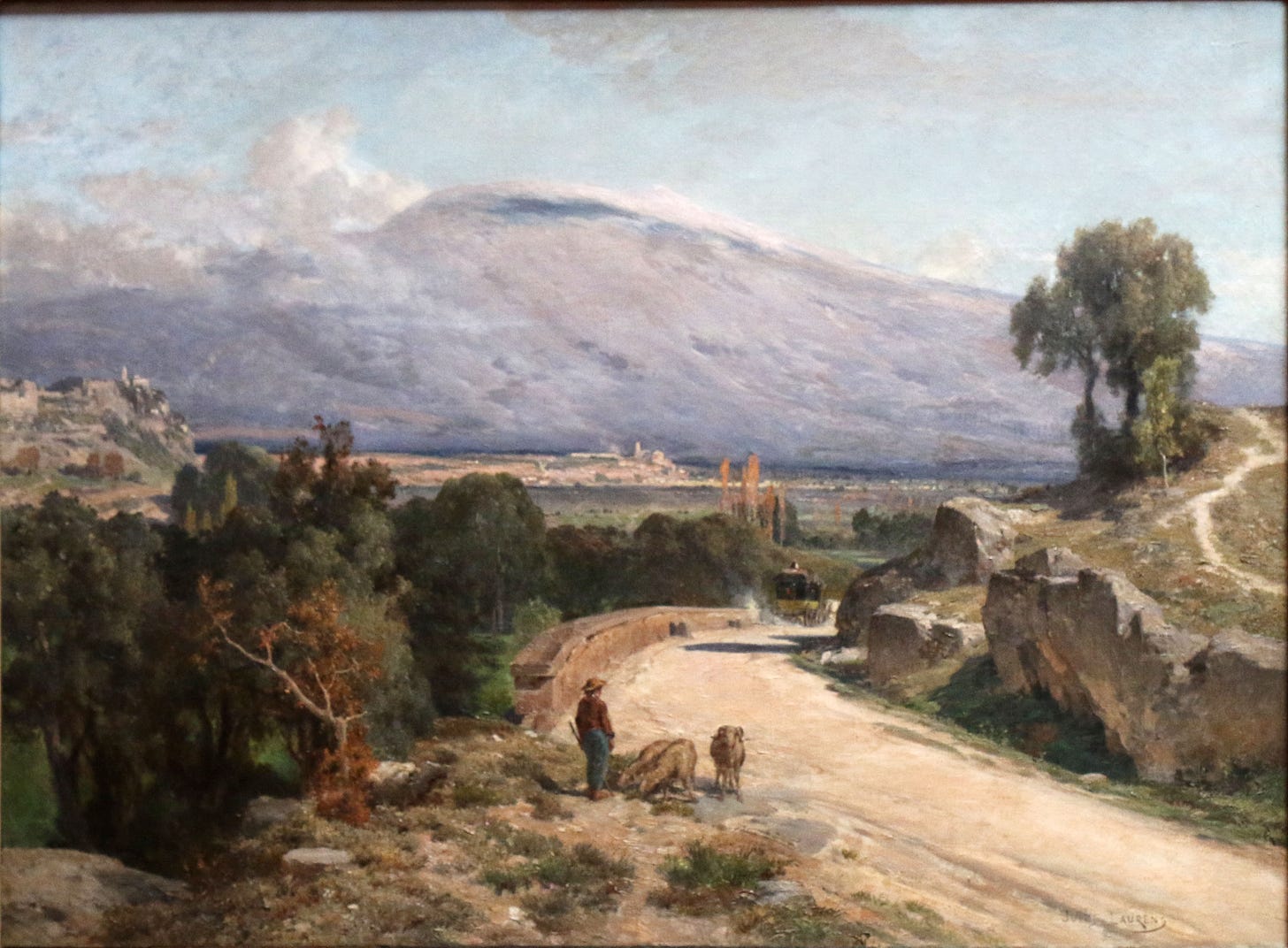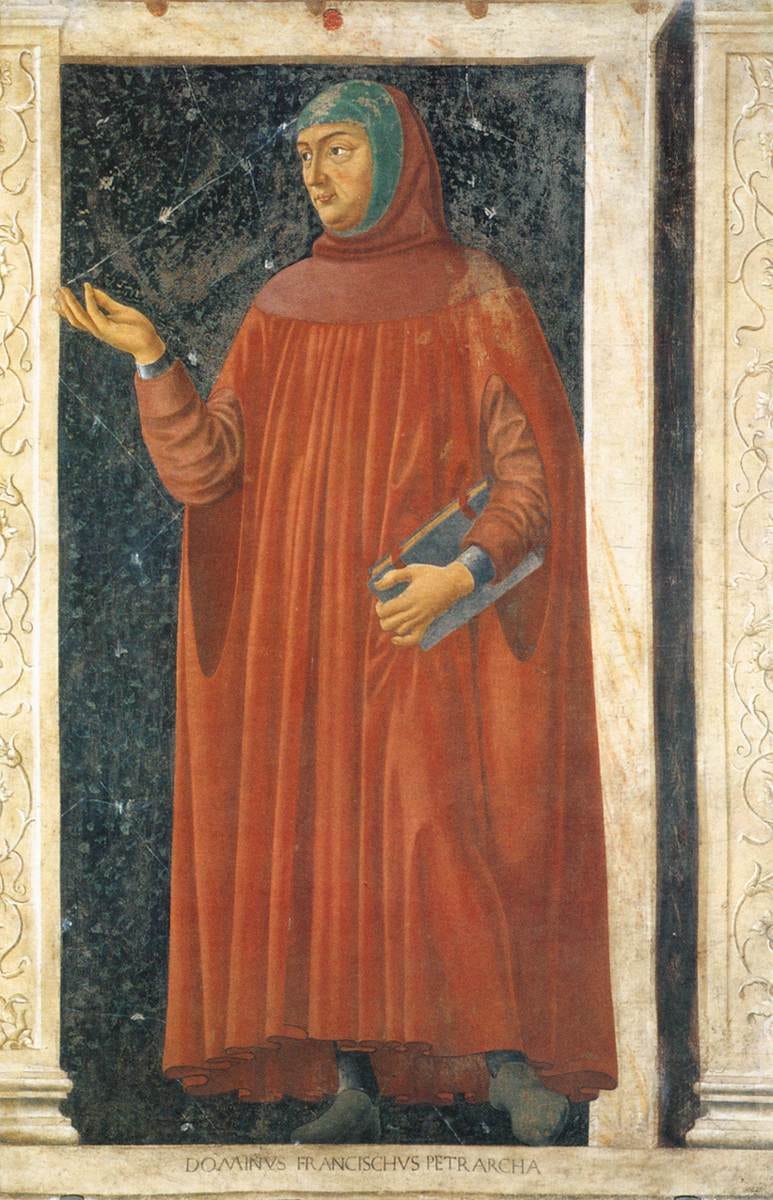Because It Is There: On Humanism, Francesco Petrarch, and The Ascent of Mont Ventoux
Some find the motivation to wander in the wilderness silly, useless, risky, or mundane. However, a 14th-century letter by a poet reveals that the zest to explore can be profound and edifying.

“The only motive for my ascent was the wish to see what so great a height had to offer.”
-Francesco Petrarch, The Ascent of Mont Ventoux
Why does a mountain lure humans to the summit? Perhaps more interestingly, why are only a few humans captivated by the quest to wander? What provokes some of us to leave the comfortable abode of our homes to contend with the elements: storms, dangerous creatures, extremes of cold and heat, diseases, potential theft or violence from strangers? So many risks await us outside that can be easily avoided by staying put. And what are we to make of the people who respond that they took these daring adventures “because it is there” and seem to find meaning in it?
While perusing the volumes of The Bedford Anthology of World Literature, I came across a brief letter from a 14th-century poet and humanist of the early Italian Renaissance, Francesco Petrarch. Petrarch (1304 to 1374) is considered the first “Renaissance man” due to the breadth of his interests. He traveled widely in Europe, served as a diplomat, wrote poetry in both Latin and Italian, restored the writings of the great Roman orator Cicero and the Roman historian Livy, gardened, fished, played the lute, and climbed mountains.
The keen interest in a wide array of worldly subjects and activities is foundational to the philosophical approach to life known as humanism. Petrarch is credited as the founder of humanism. Humanism is an ethos that attempts to place humanity, rather than God or religious doctrines, at the center of our moral and philosophical concerns, and it boldly proclaims that we are on our own to chart and choreograph our lives. In short, we are tasked with deriving our meaning and purpose that can only be found in this world with one another. The American scholar Morris Bishop summarized Petrarch’s inclination to humanism, saying,
“He helped to define and form the modern sensibility, in its appreciation of the beauty in nature, in its sense of the mystery and marvel in everyday reality, in its idealization of romantic love, in its refinement of self-scrutiny.”
Humanists, therefore, look to our reason, life experiences, and humanity—our society, culture, literature, history, nature, and the entire cosmos—for all of life’s deep and alluring questions and answers. Given the vast majority of humans who subscribe to one religion or another, humanism stands as the perennial underdog and alternative approach to life.

Petrarch’s letter to his friend, an Augustinian monk, Father Dionisio Da Borgia San Sepolchro, recounts his ascent of Mont Ventoux with his brother Gherardo in 1336. The account is rather ordinary at first glance and retells a day hiking up a not-too-strenuous mountain in the Provence region of southern France. Mont Ventoux, translated as the “Windy Mountain,” is even considered by some to hardly reach the stature of a proper mountain and is deemed more of a hill. If written today, such an account might, at best, make for a good student essay or maybe even a charming Substack post! Of all the notable works of Petrarch, I wondered why this was chosen to be compiled in an anthology of the world’s greatest literature.
On closer inspection, Petrarch’s letter gets to the heart of humanism and relays a series of meaningful instances from his climb. He begins his second sentence by declaring that “the only motive for my ascent was the wish to see what so great a height had to offer.” It takes a bit of foreknowledge of the literature preceding and leading up to Petrarch’s time to realize how unusual and modern a statement like this sounds from someone living in the Middle Ages.
Throughout his journey up the mountain Petrarch comments on a wide array of topics: love and vice; life and death; poetry and history; strengths and weaknesses; the beauty of the landscape; how he had set his sights on the mountain since childhood; how he was inspired to climb by reading Livy’s History of Rome the day before; his difficulty he had in finding a climbing companion; the different routes he and his brother had taken up the slopes; and how struggling to climb the mountain is an apt metaphor for attaining the “blessed life.” Indeed, much of his language is full of poetic expression, and he quotes from Virgil and Ovid to parade his bardic tradition.
Such statements and behaviors speak to the formative humanist in Petrarch, who commits to seeing the world as deeply and widely as possible and steps back to peer down from a mountain summit all to marvel at our place in it.
While making their ascent, they encounter an old shepherd who attempts to dissuade them from continuing their climb, stating that,
“Some fifty years before he had, in the same ardour of youth, climbed to the summit and had got nothing from it except fatigue and repentance and torn cloths and scratches from the rocks and briars. Never, according to what he or his friends knew, had anyone ever tried the ascent before or after him.”
Something about this passage gave me pause. I find it rather unfortunate how often older generations, who have lost their wanderlust or, perhaps, never had it to begin with, feel it’s their business to steer youth away from taking exciting risks and indulging in meaningful adventures, and think their experience magically maps on to another’s. This is arguably a far bigger problem in the context of our day and age than Petrarch’s, for we live in a time when social media and much of our culture hijack our time and attention in incredible ways, all the while breeding epidemic levels of fear, anxiety, and depression in many of us. As a consequence, large swaths of our population, I worry, have been scared into complacency and no longer know what it means to live a deliberate or adventurous life. Today, we remain handicapped from properly knowing, much less engaging with, the wider world in any real face-to-face sense.
Far too many of us are not unlike the cynical old shepherd nowadays, telling our youth that they’ll find nothing but pain and misery if they attempt a challenging journey, so they stay glued to TikTok and Instagram, dreaming in cyberspace, yet remaining perpetually stunted in the real world. Petrarch, fortunately, has his wits about him to decline turning back from his sojourn and defiantly states,
“But his counsel merely increased our eagerness to go on, as a young man’s mind is usually suspicious of warnings.”
What would a Renaissance man like Petrarch make of our day and age with all our perplexing issues? How do we alleviate the problems youth are suffering from, and better teach them to be appropriately suspicious of the ill-reasoned warnings of their fretful elders that prevent them from climbing mountains and seeing the larger world outside the realm of social media?
Upon reaching the summit, Petrarch pulls out a copy of Augustine’s Confessions to read a line at random. The passage that falls open on the page reads,
"And men go about to wonder at the heights of the mountains, and the mighty waves of the sea, and the wide sweep of rivers, and the circuit of the ocean, and the revolution of the stars, but themselves they consider not."
Though we might not think of such stream of consciousness commentary as particularly noteworthy today, Petrarch is one of the first on record to articulate a secular ethos of wandering that is distinct from the motivations of religious pilgrimages.
As stated in the third volume of the Bedford Anthology of World Literature,
“Petrarch makes this climb he has dreamed of since childhood not because he thinks any spiritual, military, or scientific purpose will be served, but because of ‘the wish to see what so great a height had to offer’—in other words, because it is there. Petrarch’s is the first recorded Western expression of the desire to climb a mountain for the sheer sake of doing so, and an early example of the Renaissance Europeans’ zest for discovery and adventure. Private impulse and personal desire are for Petrarch valid reasons for undertaking a project others might deem silly, reckless, or unnecessary.”
What emerges from this seemingly mundane letter of someone going for a moderately intense hike for the day—something we might not even care to mention nowadays—is how profoundly meaningful these otherwise quotidian experiences can be. Indeed, what Petrarch describes is what we refer to today as “peak experiences” or an altered state of consciousness where one feels euphoric, aspirational, and self-actualized. At multiple points, Petrarch is left not only reflecting on history as he stares out onto the French Alps contemplating Hannibal’s crossing of them with elephants during the Second Punic War to attack Rome, but he is also sharing his thoughts on his process of self-actualization and how he has changed. As he reflects,
“Then a new idea came to me, and I started thinking in terms of time rather than space. I thought: ‘Today marks ten years since you completed your youthful studies and left Bologna….Think of all the changes in your character these intervening years have seen!”
There is something powerful, liberating, and therapeutic in one’s ability to take great pleasure in what is already around us. As I explained in Wandering and Mindfulness: On the Right to Slow Down,
Slowing down and appreciating the small details of our world is one of the most remarkable discoveries and enhancements one can make to their life. It is a central component to what I mean in my definition of wandering, appreciating that adventure is all about how you see things rather than what you look at or where you are situated on the globe. Acts of wandering infused with mindfulness allow adventures for anyone, anywhere.
Although I have taken many journeys in life so far, I still find myself amazed at how much clarity of thought comes to me when I am taking a simple hike in the woods or clambering up a mountain. Something seems to stir inside of us, and we become much more alive while out wandering. I can only hope more of us will continue to discover this basic, yet profound truth of being in nature and being on the move.
Without knowing his words would survive for posterity, Petrarch concludes his letter stating,
“You see, dearest father, that I wish to conceal nothing of myself from you. I describe to you not only the course of my life but even my individual thoughts. And I ask for your prayers that these vague and wandering thoughts of mine may some day become coherent and, having been so vainly cast in all directions, that they may direct themselves at last to the one, true, certain, and never-ending good.”
Out of this brief set of poetic musings and raw honesty in a letter written nearly 700 years ago emerges the stirrings of a kind of humanist manifesto and claim: That this world and the entire cosmos is enough, that it contains a near-infinite amount of wisdom and edifying experiences for us to discover and occupy our minds. Petrarch demonstrates that we can take immense pleasure from being in nature, like climbing a mountain, all because it is there.
If you enjoyed this article, consider these related articles from Those Who Wander:
The Case for Slow Travel and Slow Reading in a Fast-Paced Society
On Pilgrimage and Travel: Where Does Our Venturesome Spirit Come From?
How Do We Combat Brain Rot? Heed Thoreau’s Advice to Live More Deliberately
Thanks for being a fellow traveler with me through this read. Please consider subscribing, sharing, and supporting this project—much more to follow.
Cheers!
-JSB




